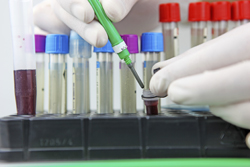Epigenetic biomarkers in cancer
Understanding the mechanisms underlying cancer still poses a major challenge to the scientific community. Apart from accumulation of genetic abnormalities, it has become evident that reversible epigenetic modifications of the genetic material can also contribute to oncogenesis. In particular, promoter DNA methylation of tumour suppressor or DNA repair genes have been linked to tumour progression. To aid the detection of epigenetic markers in cancer, the EU-funded Epidiacan project is developing novel methodologies. The consortium is concentrating on prostate and colorectal cancer for diagnosing selected covalent histone modifications (acetylation, methylation, phosphorylation, ubiquitination). Additionally, the enzymes involved in these processes, such as histone (de)acetylases and (de)methyltransferases, are being investigated. Various models and antibody-based tools have so far been developed to study the role of epigenetic changes in cancer progression. The ultimate goal is to bring such diagnostic tools to the clinic for the efficient and sensitive detection of epigenetic biomarkers in patients. Based on the principle that histone modifications and their enzymes could act as markers of early oncogenesis, the Epidiacan project is hoping to be able to prognose cancer. These non-invasive diagnostic approaches are expected to advance existing methods of cancer detection and improve the life expectancy of millions of cancer sufferers.







